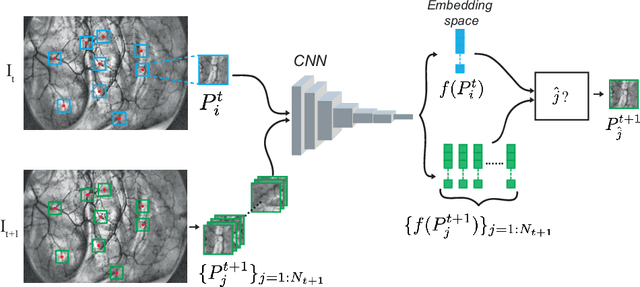Manel Farhat
Graph Self-Supervised Learning for Endoscopic Image Matching
Jun 19, 2023Abstract:Accurate feature matching and correspondence in endoscopic images play a crucial role in various clinical applications, including patient follow-up and rapid anomaly localization through panoramic image generation. However, developing robust and accurate feature matching techniques faces challenges due to the lack of discriminative texture and significant variability between patients. To address these limitations, we propose a novel self-supervised approach that combines Convolutional Neural Networks for capturing local visual appearance and attention-based Graph Neural Networks for modeling spatial relationships between key-points. Our approach is trained in a fully self-supervised scheme without the need for labeled data. Our approach outperforms state-of-the-art handcrafted and deep learning-based methods, demonstrating exceptional performance in terms of precision rate (1) and matching score (99.3%). We also provide code and materials related to this work, which can be accessed at https://github.com/abenhamadou/graph-self-supervised-learning-for-endoscopic-image-matching.
Self-Supervised Endoscopic Image Key-Points Matching
Aug 24, 2022



Abstract:Feature matching and finding correspondences between endoscopic images is a key step in many clinical applications such as patient follow-up and generation of panoramic image from clinical sequences for fast anomalies localization. Nonetheless, due to the high texture variability present in endoscopic images, the development of robust and accurate feature matching becomes a challenging task. Recently, deep learning techniques which deliver learned features extracted via convolutional neural networks (CNNs) have gained traction in a wide range of computer vision tasks. However, they all follow a supervised learning scheme where a large amount of annotated data is required to reach good performances, which is generally not always available for medical data databases. To overcome this limitation related to labeled data scarcity, the self-supervised learning paradigm has recently shown great success in a number of applications. This paper proposes a novel self-supervised approach for endoscopic image matching based on deep learning techniques. When compared to standard hand-crafted local feature descriptors, our method outperformed them in terms of precision and recall. Furthermore, our self-supervised descriptor provides a competitive performance in comparison to a selection of state-of-the-art deep learning based supervised methods in terms of precision and matching score.
 Add to Chrome
Add to Chrome Add to Firefox
Add to Firefox Add to Edge
Add to Edge